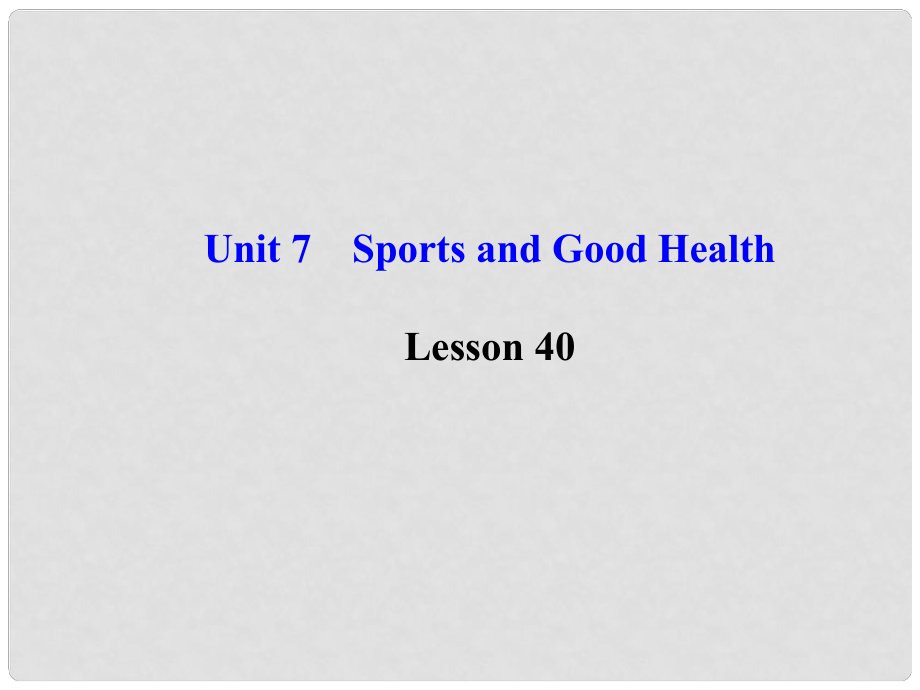《七年級(jí)英語(yǔ)下冊(cè) Unit 7 Sports and Good Health Lesson 40課件 (新版)冀教版》由會(huì)員分享���,可在線閱讀����,更多相關(guān)《七年級(jí)英語(yǔ)下冊(cè) Unit 7 Sports and Good Health Lesson 40課件 (新版)冀教版(15頁(yè)珍藏版)》請(qǐng)?jiān)谘b配圖網(wǎng)上搜索���。
1��、Unit 7 Sports and Good HealthLesson 40. 短語(yǔ)互譯短語(yǔ)互譯1. used to _2. not. . . any more _3. 體重增加��;長(zhǎng)胖體重增加���;長(zhǎng)胖 _4. 出去出去 _5. 站在某人一邊;支持某人站在某人一邊��;支持某人 _答案:答案:1. 過去常常過去常常 2. 不再不再 3. put on weight4. get out 5. on ones side. 句型展示句型展示1. 他們過去在一起常常很活躍��。他們過去在一起常常很活躍�。They _ _ _ very active together. 2. 現(xiàn)在本為蒂姆擔(dān)心。現(xiàn)在本為蒂姆擔(dān)心���。No
2����、w Ben _ _ Tim. 3. 讓我們?cè)陉?yáng)光下玩耍。讓我們?cè)陉?yáng)光下玩耍�����。Lets play _ _ _ . 4. 我真的感到幸運(yùn)����。我真的感到幸運(yùn)。I _ _ _ . 答案:答案:1. used to be 2. worries about 3. in the sun4. feel really luckyThey used to be very active together. 他們過去在一起常常很活躍�。他們過去在一起常常很活躍?�!咀灾黝I(lǐng)悟【自主領(lǐng)悟】used to do 表示過去常常做某事���,描述過去經(jīng)常表示過去常常做某事�,描述過去經(jīng)常發(fā)生的動(dòng)作或存在的狀態(tài)�,而現(xiàn)在卻不再發(fā)生。其中的發(fā)生的
3��、動(dòng)作或存在的狀態(tài),而現(xiàn)在卻不再發(fā)生���。其中的to是是不定式符號(hào)�,不是介詞�,所以其后接不定式符號(hào)�,不是介詞,所以其后接動(dòng)詞原形動(dòng)詞原形(不接動(dòng)名詞不接動(dòng)名詞)�����。例如:例如:He used to live in Paris. 他過去一直住在巴黎�����。他過去一直住在巴黎�����?�!居梅ū嫖觥居梅ū嫖觥颗c與used to不同搭配的用法不同搭配的用法be used to doing意為意為“習(xí)慣于做某事習(xí)慣于做某事”,其中的其中的to是介詞是介詞,后接動(dòng)后接動(dòng)詞要用詞要用動(dòng)名詞動(dòng)名詞He is used to living in the country.他已習(xí)慣他已習(xí)慣于住在鄉(xiāng)下����。于住在鄉(xiāng)下。be used to d
4��、o sth.表示表示“被用來做某被用來做某事事”,是動(dòng)詞是動(dòng)詞use的的被動(dòng)語(yǔ)被動(dòng)語(yǔ)態(tài)態(tài)結(jié)構(gòu)結(jié)構(gòu)(此時(shí)意為此時(shí)意為“被用被用來來”,其中的其中的to為不定式為不定式符號(hào)符號(hào),其后要接動(dòng)詞原形其后要接動(dòng)詞原形)This kind of machine is used to make books.這種機(jī)器是用來這種機(jī)器是用來制造書的。制造書的��?!净顚W(xué)活用【活學(xué)活用】 Her son _ Coke, but now he _ milk. A. used to drink; is used to drinkingB. used to drinking; drinksC. is used to drin
5、king; used to drinkD. is used to drink; is drinkingSam, you always get up early every morning. Do you like it? Not really, but _ . A. I used to it B. Im used to itC. I used to do it D. Im used to do itBamboo can _ paper. A. used to make B. be used makeC. be used to makeD. be used to makingBut I feel
6�����、 really lucky. 但是我真的感到幸運(yùn)��。但是我真的感到幸運(yùn)�。【自主領(lǐng)悟【自主領(lǐng)悟】lucky為形容詞�����,是由名詞為形容詞�����,是由名詞luck加加-y構(gòu)成的形容構(gòu)成的形容詞����。其反義詞為詞。其反義詞為unlucky。例如:����。例如:You are lucky. 你是幸運(yùn)的。你是幸運(yùn)的���?�!居梅ū嫖觥居梅ū嫖觥縧ucky變形記變形記luck名詞名詞(不可數(shù)不可數(shù)),意為意為“運(yùn)氣運(yùn)氣,好運(yùn)好運(yùn),幸運(yùn)幸運(yùn)”Good luck!好運(yùn)好運(yùn)!luckily副詞副詞,意為意為“幸運(yùn)幸運(yùn)地地,幸虧幸虧,僥幸僥幸”Luckily there was a doctor on the spot.幸運(yùn)的是現(xiàn)場(chǎng)有一位醫(yī)
7、生���。幸運(yùn)的是現(xiàn)場(chǎng)有一位醫(yī)生�?!净顚W(xué)活用【活學(xué)活用】 _ (lucky), we get here on time! It is _ (luck) to pass the exam. 祝你好運(yùn)。祝你好運(yùn)��。Good _ to you. 答案:答案:Luckily lucky luck. 用所給詞的適當(dāng)形式填空用所給詞的適當(dāng)形式填空1. My grandfather used to_ (live) in the country, but now he lives with us. 2. I began to put on _ (weigh) since I had these medicine. 3
8��、. The boy is _ (luck) to have a chance to speak to foreigners. 答案:答案:1. live 2. weight 3. lucky4. Im on _ (you) side in this question. 5. Lets _ (visit) the Great Wall tomorrow. 答案:答案:4. your 5. visit . 單項(xiàng)填空單項(xiàng)填空1. Dont spend _ time playing _ computer games. Its bad for you. A. too much; too much B.
9���、too many; too manyC. too much; too many D. too many; too much2. My father used to _ in a middle school. But now he works in a bank. A. work B. worked C. working D. works3. Dont worry _ your baby. He is very well. A. at B. with C. about D. on4. Dont read books _ the sun. Its bad for your eyes. A. under B. in C. below D. on5. Dont smoke _. Its bad for your health. A. any much B. any moreC. no more D. many
 七年級(jí)英語(yǔ)下冊(cè) Unit 7 Sports and Good Health Lesson 40課件 (新版)冀教版
七年級(jí)英語(yǔ)下冊(cè) Unit 7 Sports and Good Health Lesson 40課件 (新版)冀教版

